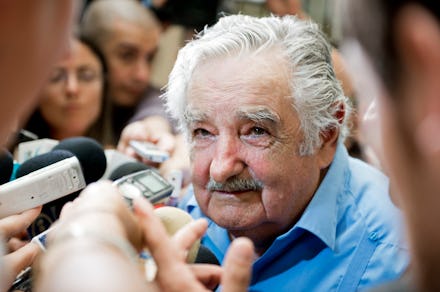Uruguay's President Takes a Stand and Offers to Welcome Guantanamo Detainees as Refugees

Uruguay President José "Pepe" Mujica has offered to welcome Guantanamo detainees as refugees.
The infamous U.S. detention center in Guantanamo Bay, Cuba, emblematic of America's "War on Terror," still holds 154 people as of this month. The Obama administration is aiming to close the detention center down for good.
Mujica's offer has to do with Uruguay's commitment to human rights — but it is also a move that hits close to home for him.
"I was imprisoned for many years and I know how it is," said Mujica, who was once a revolutionary guerrilla during Uruguay's military dictatorship. "They are coming as refugees, and there will be a place for them in Uruguay if they want to bring their families."
Framing Guantanamo detainees as refugees rather than unproven terrorists is an important distinction and totally in character for "the world's poorest president."
Mujica, who spent 14 years imprisoned in dungeon-like conditions in the 1970s and '80s, is famous for abiding by the Golden Rule in government. He and his wife, also an accomplished and high-level politician, still make their home in a one-bedroom flower farm outside of Montevideo, rather than a presidential palace. Famously, his personal presentation is informal, to say the least. By living within his means, like the people he represents, Mujica leads by example both within Uruguay and among his fellow world leaders, who have yet to walk the walk about economic inequality like this.
Image Credit: AP
His small-c conservatism has opened the door for huge liberal reforms since his election in 2010. Uruguay has passed legislation in favor of same-sex marriage, abortion rights and legalizing and regulating marijuana. It's also become one of the safest and least corrupt nations in South America.
No wonder Mujica wants to extend a hand to those who were once in his shoes: He himself calls Uruguay "an island of refugees in a world of crazy people."
But he's ambivalent about the rest of the world framing him as a leader who chooses poverty.
"I'm not the poorest president," he said. "The poorest is the one who needs a lot to live."
After living in Guantanamo Bay, the former detainees could do a lot worse.